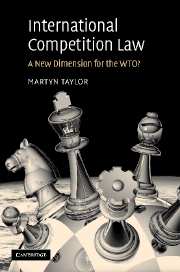Book contents
- Frontmatter
- Contents
- List of tables and figures
- List of abbreviations
- 1 Introduction
- PART I An International Competition Agreement is Desirable
- PART II The WTO Would Provide a Suitable Institutional Vehicle
- PART III The Optimal Form for a WTO Competition Agreement
- 10 What are the optimal objectives and principles for a WTO competition agreement?
- 11 What is the optimal content for a WTO competition agreement?
- 12 What is the optimal structure for a WTO competition agreement?
- 13 Would a WTO competition agreement be politically achievable?
- 14 Conclusion: a plurilateral competition agreement should be incorporated into the WTO
- APPENDIX: Draft negotiating text for a plurilateral WTO competition agreement
- Index
14 - Conclusion: a plurilateral competition agreement should be incorporated into the WTO
Published online by Cambridge University Press: 17 July 2009
- Frontmatter
- Contents
- List of tables and figures
- List of abbreviations
- 1 Introduction
- PART I An International Competition Agreement is Desirable
- PART II The WTO Would Provide a Suitable Institutional Vehicle
- PART III The Optimal Form for a WTO Competition Agreement
- 10 What are the optimal objectives and principles for a WTO competition agreement?
- 11 What is the optimal content for a WTO competition agreement?
- 12 What is the optimal structure for a WTO competition agreement?
- 13 Would a WTO competition agreement be politically achievable?
- 14 Conclusion: a plurilateral competition agreement should be incorporated into the WTO
- APPENDIX: Draft negotiating text for a plurilateral WTO competition agreement
- Index
Summary
This book proposes that a plurilateral competition agreement should be incorporated into the WTO.
Summary
With this in mind, Part I of this book concluded that an international competition agreement is desirable. Part II of this book concluded that the WTO could provide a suitable institutional vehicle for an international competition agreement. Part III of this book concluded that the optimal form for such an international competition agreement at the present time would be a plurilateral WTO agreement in the form identified in the Appendix to this book.
Each of the chapters of this book contributed to these conclusions in the following manner.
An international competition agreement is desirable and would be welfare-enhancing relative to the status quo (Chapters 2 and 3)
Modern competition law is intended to promote and maintain workable competition in order to facilitate greater market efficiency. Such efficiency will, in turn, promote economic growth and increased social welfare. While direct empirical evidence of the benefits of competition law is difficult to obtain, the available evidence suggests such benefits are significant. Essentially, competition law deters and prevents anti-competitive conduct that may otherwise result in welfare losses to society.
Competition law is the principal instrument of competition policy and may create an environment conducive to the adoption of complementary competition policies, such as market deregulation. Such competition policies, in turn, may materially contribute to economic growth and increased social welfare. The benefits of such competition policies have been empirically quantified and are also significant.
- Type
- Chapter
- Information
- International Competition LawA New Dimension for the WTO?, pp. 423 - 434Publisher: Cambridge University PressPrint publication year: 2006



